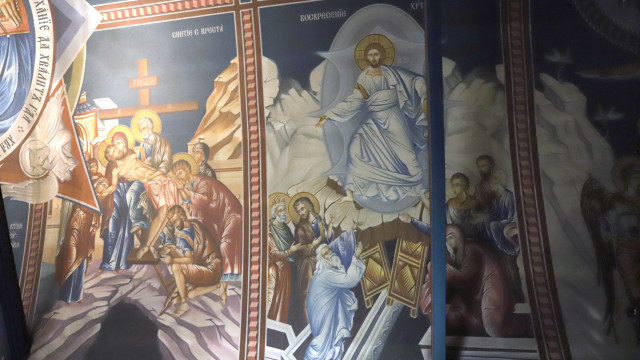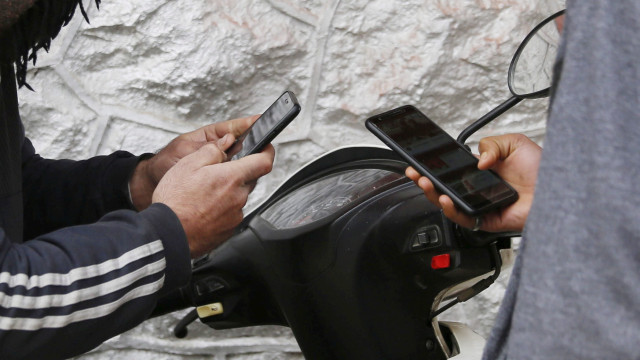Holy Tuesday
Gospel of Mark 11:27 – 33
THE ANSWER OF THE LORD JESUS CHRIST TO THE ORIGIN OF JOHN'S BAPTISM
And they came again to Jerusalem. And when He was walking through the Temple, the chief priests and the scribes approached Him and said to Him: by what authority do You do this? And who gave You this authority to do this? And Jesus answered them: I will also ask you, and answer me; then I will tell you by what authority I do this. Was the baptism of John from heaven or from men? Answer me. And they reasoned among themselves: if we say from heaven, he will say: why didn't you believe him? If we say from the people - they were afraid of the people; for all believed that John was indeed a prophet. And they said in answer to Jesus: we do not know. Then Jesus said to them: neither do I tell you by what authority I do these things.
Gospel of Matthew 21: 28 – 32
PARABLE OF THE OBEDIENT AND DISOBEDIENT SONS
What do you think? A man had two sons*; and he went to the first and said: Son, go work today in my vineyard. But he answered: I will not, and then he repented and went away. And going to the other, he told him the same thing. He answered: I will go, my lord; but he didn't go. Which of the two fulfilled the father's will? They answer Him: the first. Jesus said to them: I tell you the truth, tax collectors and harlots overtake you in the Kingdom of God; because John came to you in the way of righteousness, and you did not believe him; and the publicans and the harlots believed him; but you, seeing this, did not afterwards repent to believe him.
Explanation: through the parable, Christ describes faithfulness and the will to keep the given word. The Father (man) is the Lord God, and the sons are the Jews and the Gentiles. The father's (God's) will be fulfilled by the first son, i.e. the Gentiles who believed in Him; from the last they became the first, becoming God's people, while the Jews were waiting for the Messiah, promised the God of hosts that they would be faithful to Him, and when the Messiah came, they rejected Him and crucified Him. In the explanation of the two sons, St. Theophanes the Prisoner adds that the second son is an image of frivolous, lazy-willed people.
Gospel of Matthew 21: 33 – 46
PARABLE OF THE BAD VINEYARDS
Listen to another parable: there was a farmer who planted a vineyard, surrounded it with a hedge, dug a linden in it, built a tower and, having given it to vinedressers, went away. And when the vintage drew near, he sent his servants to the vinedressers to gather the fruit for him. And the vinedressers, having caught his servants, beat some, killed others, and stoned others. Again he sent other servants, more than the first; and they did the same to them. At last, he sent his son to them, saying: they will be ashamed of my son. But when the vinedressers saw the son, they said to themselves: this is the heir; let's kill him and take his inheritance. And when they had caught him, they brought him out of the vineyard and killed him. So when the lord of the vineyard comes, what will he do to these vinedressers? They answered him: the wicked will destroy badly, and the vineyard will be given to other vinedressers, who will give him the fruits in due time. Jesus said to them: have you never read in the Scriptures: "The stone which the builders rejected has become the head of the corner: this is from the Lord, and it is wonderful in our eyes"? therefore, I say to you, that the Kingdom of God will be taken from you and given to a nation that brings forth its fruits; and whoever falls on that stone will be broken; and on whom it falls, it will crush him.
And when they heard His parables, the chief priests and the Pharisees understood that He was talking about them and they were on the lookout to catch Him, but they were afraid of the people because they considered Him a prophet.
Explanation: As in every parable spoken by the Lord Jesus Christ, theologians "recognize" in this one the following characters in the characters and situations: The man-owner is God Himself, the vineyard - the Jewish people, the fence - the Law that protects the Jews from idolatry, the flax - the altar, the tower - the Jerusalem temple, the vinedressers - the high priests, the Pharisees and the scribes, the Son - the Lord Jesus Christ himself. Several important things are revealed in the parable: the long-suffering of God, the soon coming of Christ, the oneness of the Son with the Father, the crime of the Jews who destroyed the Messiah, who was already promised to them in the Old Testament, as well as the "other vinedressers" - the pagans who believed and professing their faith in the Holy Trinity, and the centre of the New Testament Church is Christ Himself.
A linn is a vessel in which grapes are crushed to ferment for wine. In this case, it represents a dug-deep ditch, well isolated from the soil.
Gospel of Luke 20: 21 – 26
JESUS REJECTS THE TEMPTING QUESTIONS OF SADDUCEES AND Scribes AND ILLUMINATES WHAT THE MESSIAH'S DIGNITY CONSISTS OF:
"Render Caesar's Things to Caesar, but God's Things to God"
And they asked Him: Master, we know that you speak and teach correctly and do not judge by face, but truly teach in the way of God; are we allowed to give tribute to Caesar or not? And He, realizing their cunning, said: why are you tempting Me? Show me a denarius: whose image and inscription are these? They answered: to Caesar. He said to them: render to Caesar the things that are Caesar's, and to God the things that are God's. They were amazed at His answer and were silent.
Gospel of Matthew 22: 23 – 34
"GOD IS NOT A GOD OF THE DEAD BUT OF THE LIVING"
On that day there came to Him Sadducees who said that there is no resurrection and asked Him: Master, Moses said: if a man dies childless, let his brother take his wife and bear offspring to his brother; we had seven brothers: the first married and died, and because he had no offspring, he left his wife to his brother; also the second, the third, even to the seventh; and after them, the woman also died; and so, at the resurrection, which of the seven will she be the wife of?* Jesus answered them: you are deceiving yourself, because you do not know the Scriptures, nor the power of God; because at the resurrection they neither marry nor are given in marriage, but remain as Angels of God in the heavens. And about the resurrection of the dead, have you not read what God said to you: "I am the God of Abraham, and the God of Isaac, and the God of Jacob." God is not the God of the dead but of the living.
And when the Pharisees were gathered, Jesus asked them: what do you think about Christ? Whose Son is it? answer Him: to David. Jesus tells them: how then does David, by inspiration, call Him the Lord: "The Lord said to my Lord: sit at My right hand until I make Your enemies a footstool for Your feet"? and so if David calls Him Lord, how then is He his son? And no one could answer Him, and from that day no one dared to question Him.
Levirate marriage: here the Sadducees refer to the text from Deuteronomy (25: 5 – 6). It is about a marriage between a widowed, childless woman and the brother of her deceased husband. Such marriages are characteristic of closed societies and aim, by creating offspring, to preserve the line of inheritance in the family.
Gospel of Mark 12: 28
Gospel of Matthew 22: 37 – 40
Gospel of John 13: 34 - 35; 15: 9 – 17
THE NEW COMMANDMENT
One of the scribes, hearing their argument and seeing that Jesus answered them well, approached and asked Him: which is the first commandment of all? And Jesus answered him:
LOVE THE LORD YOUR GOD WITH ALL YOUR HEART, AND WITH ALL YOUR SOUL, AND WITH ALL YOUR MIND: THIS IS THE FIRST AND GREATEST COMMANDMENT.
And the second, similar to it, is: LOVE YOUR NEIGHBOR AS YOURSELF. The whole Law and the prophets are based on these two commandments.
A new commandment I give unto you, TO LOVE ONE ANOTHER; AS I HAVE LOVED YOU, LET YOU ALSO LOVE ONE ANOTHER.
By this, everyone will know that you are My disciples if you have love among yourselves. As the Father has loved me, so have I loved you: abide in my love. If you keep My commandments, you will abide in My love, just as I have kept My Father's commandments, and I abide in His love. I have told you this so that My joy may dwell in you, and that your joy may be full. THIS IS MY COMMANDMENT: THAT YOU LOVE ONE ANOTHER AS I HAVE LOVED YOU.
Greater love has no one than this, to lay down one's life for one's friends. You are my friends if you do all that I command you. I no longer call you servants, because the servant does not know what his master is doing; and I have called you friends because I have told you all that I have heard from My Father. You did not choose Me, but I chose you and appointed you to go and bear fruit, and that your fruit should remain, so that whatever you ask the Father in My name, He will give you. This I command you: love one another.
Gospel of John 14: 1 – 6, 11 – 13, 15, 18, 20 – 21, 27
"I AM THE WAY AND THE TRUTH AND THE LIFE"
Let not your heart be troubled; believe in God and believe in Me. In My Father's house, there are many dwellings. If there wasn't, I would have told you. I'm going to prepare a place for you. And when I go and prepare a place for you, I will come again and take you to Myself, so that where I am you may be also. And where I am going, you know, and you know the way. Thomas said to Him: Lord, we do not know where You are going; and how can we know the way? Jesus said to him: I am the Way and the Truth and the Life; no one comes to the Father except through me. Believe Me that I am in the Father and the Father is in Me; if not, then for the works themselves believe in Me. Truly, truly, I say to you: he who believes in Me, the works that I do, he will also do, and greater than these he will do; for I go to My Father. And whatever you ask the Father in My name, that will I do. If you love Me, keep My commandments.
I will not leave you orphans; I will come to you. A little while longer and the world will no longer see Me; and you will see Me, because I live, and you will live. In that day you will know that I am in My Father, and you are in Me, and I in you. He who has My commandments and keeps them is the one who loves Me, and he who loves Me will be loved by My Father; and I will love him and reveal myself to him.
I leave you in peace; My peace I give you; I do not give to you as the world gives to you. Let not your heart be troubled, neither let it be afraid. I am going from you and will come to you again. /BGNES
----------------------
Sonia Zafirova, philosopher. The text, which was specially provided to BGNES, is part of the book "Christ's light enlightens all", which is about to be published.







